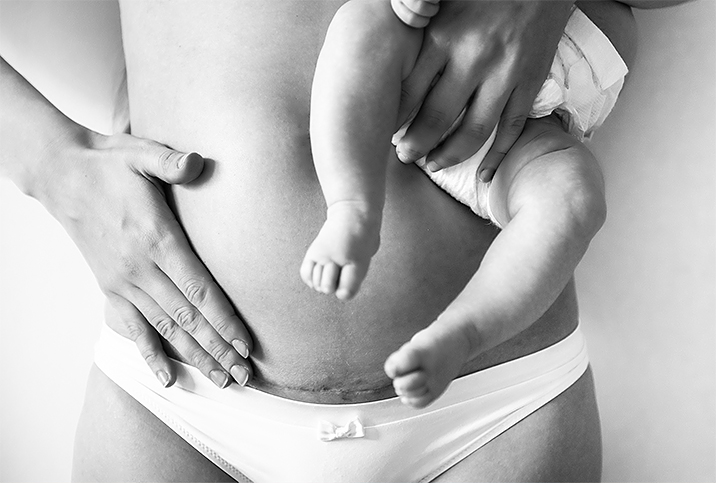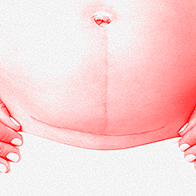Understanding the Long-Term Risks of C-Sections on Mothers and Babies

There are many reasons a doctor may advise a cesarean section be performed, particularly if the baby or mother is having health issues. But not all C-sections are performed at a doctor's recommendation.
Increasingly, mothers are electing to book a C-section birth. According to a 2011 study in the journal Obstetrics & Gynecology that looked at this growing trend, about 8 percent of mothers requested elective cesarean section surgery.
The peer-reviewed medical journal The Lancet published three papers that found between the years 2000 and 2015, the number of total C-section births rose from 12 percent to 21 percent of all births internationally. This increase is above the World Health Organization's recommendation that the ideal rate of C-section delivery should be 10 percent to 15 percent of births.
In the United States, C-section rates have increased to 31.7 percent as of 2019, according to the Centers for Disease Control and Prevention (CDC).
Although C-sections can be a life-saving surgery, the operation doesn't come without risks. In some cases, the procedure may do more harm than good for moms and babies.
How cesarean births affect new moms
Jodi Schott-Ramirez, a trained obstetrical nurse and birthing doula, is a mother of four. She had a C-section with her first child when she was 22 years old. The recommendation was made to her at the hospital because of failure to progress, one of the most common reasons for the operation.
Failure to progress is when labor lasts 20 hours or more for first-time mothers, and more than 14 hours for women who have previously given birth.
"I felt the C-section was necessary at the time," Schott-Ramirez told me. "I was in labor for a long time—two days—and when you go to the doctor, everyone is on a timeline."
After the operation, she experienced extreme exhaustion, fever and chills that lasted a month. Other possible complications for the mother from a C-section delivery can include reactions to the medication used during surgery, bleeding, blood clots, urinary tract infections, delayed return of bowel functions, injury to the bladder or bowel, and infection of the wound or uterus.
There are some less common but more serious subsequent pregnancy risks women should be aware of, such as a ruptured uterus and placenta previa.
Some effects from a C-section can turn into long-term complications.
"I still have circulation problems in my lower body and water retention problems," Schott-Ramirez said. "These are problems I will probably have for the rest of my life."
These are risks she wasn't told about ahead of time.
C-sections can also negatively impact fertility and create higher risks for future pregnancies. Peter Brocklehurst, MBChB, M.Sc., FRCOG, FFPH, FMedSci, is a professor of women's health at the University of Birmingham and director of research and development for the Birmingham Clinical Trials Unit (BCTU) in the Institute of Applied Health Research. He warned there are some less common but more serious subsequent pregnancy risks women should be aware of that occur with C-sections, such as a ruptured uterus and placenta previa.
"The scar is also a major risk in itself," Brocklehurst said. "For women who have a C-section scar and are pregnant again, there is a risk of the placenta getting stuck where the scar from the C-section is."
This is a condition known as placenta accreta, which occurs if the placenta grows too deeply into the uterine wall during pregnancy.
Besides the physical scars left after a C-section, there can be emotional scars as well. Often these are the ones that take the longest to heal.
"Having a C-section, I thought, what was wrong with me that I couldn't give birth 'naturally,'" Schott-Ramirez said. "These feelings lasted for years, even now on my daughter's birthday I will still feel that trauma."
She isn't alone in her experience. Other mothers report these feelings of guilt and trauma, too. The correlation between cesarean section and post-traumatic stress disorder (PTSD) is still being studied today.
According to one study conducted in Sweden, women who have a cesarean section are at a six times higher risk for developing postpartum depression. One to two months after the operation, one-third of women were also found to suffer from serious post-traumatic intrusive stress reactions, and when the condition wasn't diagnosed and properly treated, there were problems noted in those first important months of the woman's relationship with her baby.
An Iranian study done in 2013 found that women who delivered vaginally had a significantly better postpartum quality of life than women who underwent a C-section. In this case, quality of life referred to physical health two months postpartum and mental health four months postpartum.
Long-term effects on babies
Babies born via C-section face unique risks, and the long-term effects are still being studied.
Some research has found C-section babies have an increased risk of childhood obesity, and for preterm babies, breathing problems can be an issue. In a vaginal birth, compression through the vaginal canal helps remove the amniotic fluid from the baby's lungs. It is theorized worse respiratory outcomes for C-section babies occur because they don't get this compression and removal of fluid.
Recent research also indicates the operation can have long-term consequences for the baby's immune system. Brocklehurst was part of a team of researchers who looked at how a baby's gut microbiota is impacted by C-section birth.
Microbiota is the community of organisms that inhabit a certain location on or in an organ in the body. These organisms include bacteria, viruses and fungi. Brocklehurst's research found there was a surprising difference in the microbiota of babies born vaginally versus via C-section.
"We're supposed to be born with our mouth close to our mother's anus," Brocklehurst explained. "When babies are born, they have no microorganisms at all and are first exposed to them through the mother's vagina and anus. Once the bacteria are swallowed by the newborn, they travel through the baby's body and colonize the upper and lower intestine."
Recent research also indicates the operation can have long-term consequences for the baby's immune system.
Cesarean sections were found to disrupt this passing of microbes. In the study, the babies born via C-section had microorganisms that shouldn't be there, also known as opportunistic pathogens—organisms that can cause infection. These pathogens are thought to predispose babies to infections.
"There's a theory that the first organisms you're exposed to, your body recognizes as being there," Brocklehurst said. "It's thought that this activates your immune system to develop."
In a sense, the bacteria of the microbiota are teaching the babies' immune systems to tolerate their presence and recognize good bacteria from bad bacteria.
Schott-Ramirez recalls her firstborn had more illnesses than her other children, and those illnesses were more serious, including bronchitis and pneumonia. She suspects this could be due to the cesarean section.
What expectant parents should know ahead of time
There are still many unknowns about the long-term effects of C-sections, and it's important for new parents to know the full impact of the decisions they are making. Consulting with a doctor and other healthcare professionals can help expectant parents make the best choice for their situation.
"In the West, there is the prominent idea that women have a choice over their bodies—and rightly so," said Brocklehurst. "But those choices have potential consequences and women aren't being educated about that."
He stressed he isn't trying to fearmonger, but rather educate people at a time when C-sections have become such a common operation in some parts of the world.
"We need to understand the psychology behind what's making more women elect for C-sections and understand more about what is going on," he said, "if their decisions are being based out of misinformation or fear of the unknown."
Some women who have had C-sections, like Schott-Ramirez, are made to feel they didn't have any other choice.
Her advice to other women is for them to educate themselves on their options and advocate for doing birthing their way. At the end of the day, knowledge is the key to making empowered decisions.




















